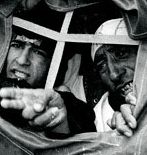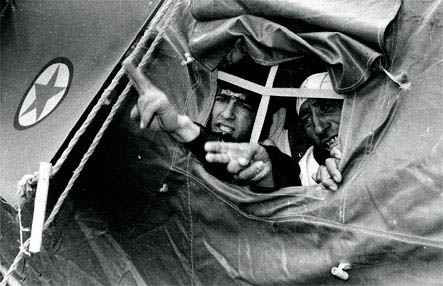|
|

based in London, I have travelled
and written about the Kurdish issue for close to
five years. I had also
worked closely with the Armenian community for
two years before turning my attention to the Kurds, and
as fate would have it, I was offered a job to work
with the United Nations Development Programme in Yerevan,
the capital of the Armenian Republic — arriving in the
country in October 1998. |
|
|
| During the first few months, life was quiet and
simple. Alongside my work as a United Nations
employee, I received some magazine assignments
to write analysis of the Kurdish issue inside
and outside of Armenia, but with the arrest of
Abdullah Ocalan, President of the PKK [Kurdistan
Workers Party], everything was to change, both
for myself and for the Kurdish community in
Armenia. After a month or so in Armenia, the
opportunity to once more immerse myself in the Kurdish
issue was a refreshing change. |
|
|
 On February 16th, Turkey declared to the world that it had finally
captured Ocalan. Throughout the world,those
Kurds loyal to the movement stormed embassies and offices everywhere,
and not least in Armenia. Several hundred Yezidi
Kurds marched on the United Nations building, taking the
head of UNHCR and the deputy head of UNDP hostage for an hour. The
next day they marched again, and hoisted a tent to accomodate twenty
Yezidi Kurds on hunger strike in protest
at the arrest of their leader. This time, the protest passed off peacefully
— albeit loudly — and with the local Armenian police nodding
-- somewhat amusingly — in approval to the chants of "Turkey
Terrorist!".
On February 16th, Turkey declared to the world that it had finally
captured Ocalan. Throughout the world,those
Kurds loyal to the movement stormed embassies and offices everywhere,
and not least in Armenia. Several hundred Yezidi
Kurds marched on the United Nations building, taking the
head of UNHCR and the deputy head of UNDP hostage for an hour. The
next day they marched again, and hoisted a tent to accomodate twenty
Yezidi Kurds on hunger strike in protest
at the arrest of their leader. This time, the protest passed off peacefully
— albeit loudly — and with the local Armenian police nodding
-- somewhat amusingly — in approval to the chants of "Turkey
Terrorist!". |
|
|
|
|
 Despite a still evident political split in the Yezidi community in
Armenia as to their roots, one thing is now certain.
If many Yezidi were relucant to show their ethnic identity in the
past, the media spotlight on the plight of Ocalan
has changed all of that. As elsewhere in the world, the
Kurdish Question could no longer be ignored or overlooked.
Despite a still evident political split in the Yezidi community in
Armenia as to their roots, one thing is now certain.
If many Yezidi were relucant to show their ethnic identity in the
past, the media spotlight on the plight of Ocalan
has changed all of that. As elsewhere in the world, the
Kurdish Question could no longer be ignored or overlooked.
|
|
|
 For myself, it was an opportunity to once again experience the
fire and the passion of the Kurds fighting for their right
to self-determination and freedom.
For myself, it was an opportunity to once again experience the
fire and the passion of the Kurds fighting for their right
to self-determination and freedom. |
|
|
|
|
Things were not so clear for the United Nations,
however, and after being denied access to the
UN building for security reasons -- all the staff
had been evacuated--I went to sit with the Kurds,
and to photograph and talk to them. One member
of the UN made an official complaint to the UN
resident coordinator, and I decided to resign.
|
|

Two of the hunger strikers watching the protest pass by the tent they set up outside the UN building in Yerevan. |
|
| ©Onnik Krikorian, a photojournalist based in Yerevan, Republic of Armenia.
Submitted March 1999.
More of his photographs and research into the Yezidi community in Armenia can be found online at: http://www.freespeech.org/oneworld/photo |
|

 On February 16th, Turkey declared to the world that it had finally
captured Ocalan. Throughout the world,those
Kurds loyal to the movement stormed embassies and offices everywhere,
and not least in Armenia. Several hundred Yezidi
Kurds marched on the United Nations building, taking the
head of UNHCR and the deputy head of UNDP hostage for an hour. The
next day they marched again, and hoisted a tent to accomodate twenty
Yezidi Kurds on hunger strike in protest
at the arrest of their leader. This time, the protest passed off peacefully
— albeit loudly — and with the local Armenian police nodding
-- somewhat amusingly — in approval to the chants of "Turkey
Terrorist!".
On February 16th, Turkey declared to the world that it had finally
captured Ocalan. Throughout the world,those
Kurds loyal to the movement stormed embassies and offices everywhere,
and not least in Armenia. Several hundred Yezidi
Kurds marched on the United Nations building, taking the
head of UNHCR and the deputy head of UNDP hostage for an hour. The
next day they marched again, and hoisted a tent to accomodate twenty
Yezidi Kurds on hunger strike in protest
at the arrest of their leader. This time, the protest passed off peacefully
— albeit loudly — and with the local Armenian police nodding
-- somewhat amusingly — in approval to the chants of "Turkey
Terrorist!".  Despite a still evident political split in the Yezidi community in
Armenia as to their roots, one thing is now certain.
If many Yezidi were relucant to show their ethnic identity in the
past, the media spotlight on the plight of Ocalan
has changed all of that. As elsewhere in the world, the
Kurdish Question could no longer be ignored or overlooked.
Despite a still evident political split in the Yezidi community in
Armenia as to their roots, one thing is now certain.
If many Yezidi were relucant to show their ethnic identity in the
past, the media spotlight on the plight of Ocalan
has changed all of that. As elsewhere in the world, the
Kurdish Question could no longer be ignored or overlooked.
 For myself, it was an opportunity to once again experience the
fire and the passion of the Kurds fighting for their right
to self-determination and freedom.
For myself, it was an opportunity to once again experience the
fire and the passion of the Kurds fighting for their right
to self-determination and freedom. 